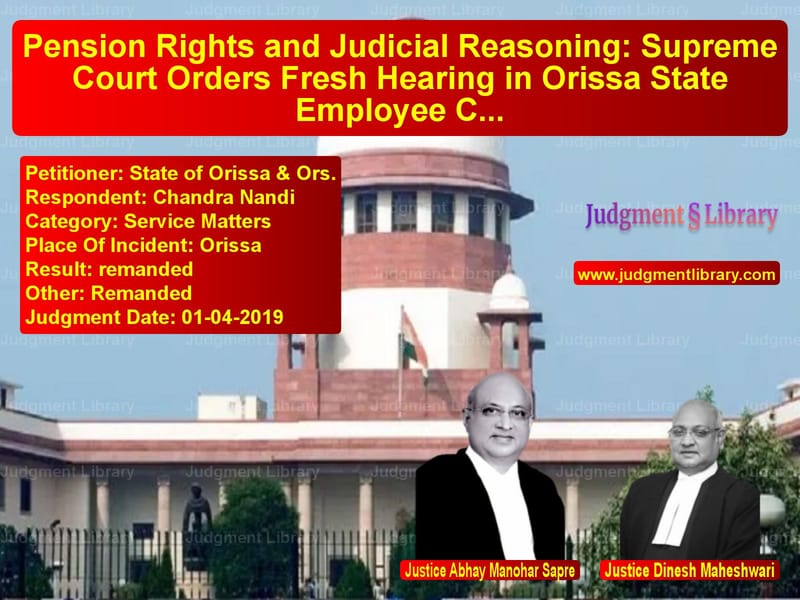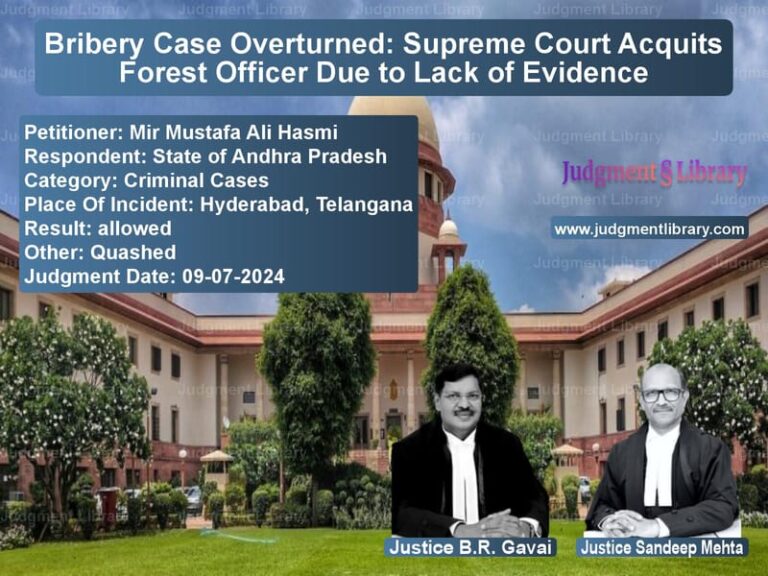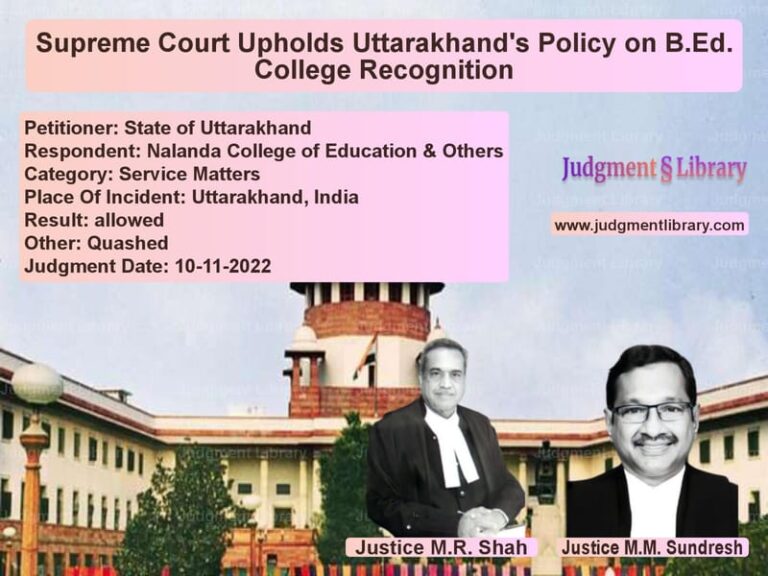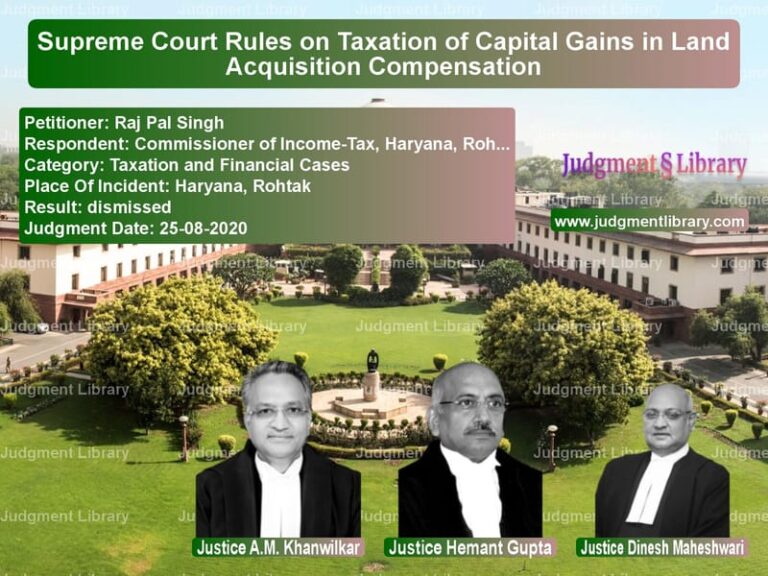Pension Rights and Judicial Reasoning: Supreme Court Orders Fresh Hearing in Orissa State Employee Case
The Supreme Court of India, in its judgment dated April 1, 2019, addressed a crucial issue concerning pensionary benefits and judicial reasoning. The case revolved around an order by the Orissa High Court that granted pensionary benefits to an employee without providing adequate reasoning. The Supreme Court, upon reviewing the case, found that the High Court’s decision lacked a reasoned judgment and set aside the order, remanding the case for fresh consideration.
Background of the Case
The dispute arose when Chandra Nandi, a retired employee, filed an Original Application (OA No.1513(C) of 2004) before the Orissa State Administrative Tribunal, seeking post-retirement benefits, including gratuity and pension. While the Tribunal granted some benefits, it declined others, leading the respondent to challenge the decision before the Orissa High Court through Writ Petition (Civil) No.19550 of 2011.
Proceedings Before the High Court
The Orissa High Court, in its judgment dated January 24, 2014, partially allowed the respondent’s petition and directed the State of Orissa to treat the respondent as a regular employee, granting him pensionary benefits. The High Court modified the Tribunal’s order and issued directions in favor of the respondent without providing a detailed discussion or reasons for the decision. The State of Orissa, aggrieved by this order, filed an appeal before the Supreme Court.
Arguments by the Parties
State of Orissa’s Arguments:
- The High Court’s decision was flawed as it did not discuss the issues raised in the case.
- No reasoning was provided for allowing the pensionary benefits that were denied by the Tribunal.
- The High Court failed to consider whether the respondent met the eligibility criteria for pension under applicable service rules.
Respondent’s Arguments:
- The Tribunal had erred in denying certain benefits, and the High Court rightly granted them.
- As a retired employee, the respondent was entitled to full pensionary benefits.
- The direction by the High Court was in accordance with the principles of social justice.
Supreme Court’s Observations
The Supreme Court reviewed the case and found that the High Court’s order lacked necessary reasoning. The Court emphasized the importance of judicial reasoning in every judgment:
“This Court has consistently laid down that every judicial or/and quasi-judicial order passed by the Court/Tribunal/Authority concerned, which decides the lis between the parties, must be supported with the reasons in support of its conclusion.”
The Court cited several precedents, reinforcing that courts must provide reasoned decisions:
- State of Maharashtra vs. Vithal Rao Pritirao Chawan, (1981) 4 SCC 129
- Jawahar Lal Singh vs. Naresh Singh & Ors., (1987) 2 SCC 222
- State of U.P. vs. Battan & Ors., (2001) 10 SCC 607
- Raj Kishore Jha vs. State of Bihar & Ors., (2003) 11 SCC 519
- State of Orissa vs. Dhaniram Luhar, (2004) 5 SCC 568
The Supreme Court held that the High Court’s failure to provide reasons for its conclusion made the order legally unsustainable.
Key Legal Principles Established
The Supreme Court reinforced several key principles through this ruling:
- Every Judgment Must Be Reasoned: Courts must provide clear reasoning for every conclusion reached in their orders.
- Reviewability of Judicial Decisions: Appellate courts must have sufficient reasoning to evaluate whether a lower court’s decision was correct.
- Natural Justice: Every party involved in a legal dispute has the right to know why a decision was made in a particular way.
Final Judgment and Remand
The Supreme Court allowed the appeal filed by the State of Orissa and set aside the High Court’s order. It remanded the case to the High Court for fresh consideration, directing that the matter be decided on its merits with proper reasoning:
“The appeal succeeds and is accordingly allowed. The impugned order is set aside. The case is remanded to the High Court for deciding the writ petition afresh, out of which this appeal arises, for its disposal in accordance with law keeping in view the observations made above.”
The Court also urged the High Court to decide the case within six months due to its age.
Impact of the Judgment
The ruling serves as a significant precedent in ensuring judicial accountability. It highlights that:
- Administrative decisions must be backed by clear reasoning.
- Pensionary benefits cannot be granted arbitrarily without assessing eligibility.
- Judicial orders must be structured in a manner that enables higher courts to review them properly.
Conclusion
The Supreme Court’s decision in State of Orissa & Ors. vs. Chandra Nandi reinforces the fundamental principle that judicial decisions must be well-reasoned. By remanding the case for fresh adjudication, the Court ensured that the High Court’s ruling would be grounded in proper legal reasoning, ensuring transparency and fairness in the grant of pensionary benefits.
Petitioner Name: State of Orissa & Ors..Respondent Name: Chandra Nandi.Judgment By: Justice Abhay Manohar Sapre, Justice Dinesh Maheshwari.Place Of Incident: Orissa.Judgment Date: 01-04-2019.
Don’t miss out on the full details! Download the complete judgment in PDF format below and gain valuable insights instantly!
Download Judgment: State of Orissa & Or vs Chandra Nandi Supreme Court of India Judgment Dated 01-04-2019.pdf
Direct Downlaod Judgment: Direct downlaod this Judgment
See all petitions in Pension and Gratuity
See all petitions in Public Sector Employees
See all petitions in Disciplinary Proceedings
See all petitions in Judgment by Abhay Manohar Sapre
See all petitions in Judgment by Dinesh Maheshwari
See all petitions in Remanded
See all petitions in Remanded
See all petitions in supreme court of India judgments April 2019
See all petitions in 2019 judgments
See all posts in Service Matters Category
See all allowed petitions in Service Matters Category
See all Dismissed petitions in Service Matters Category
See all partially allowed petitions in Service Matters Category







